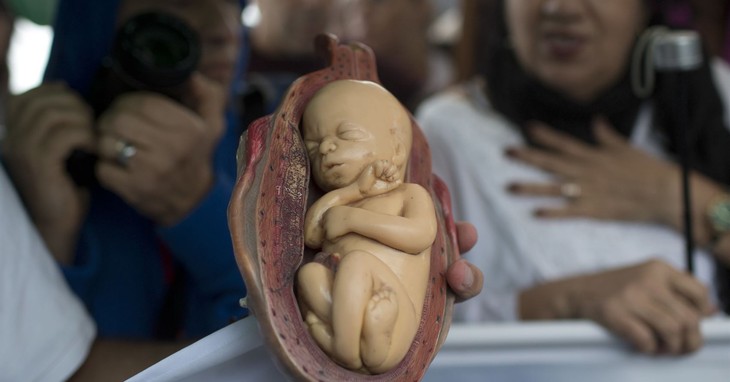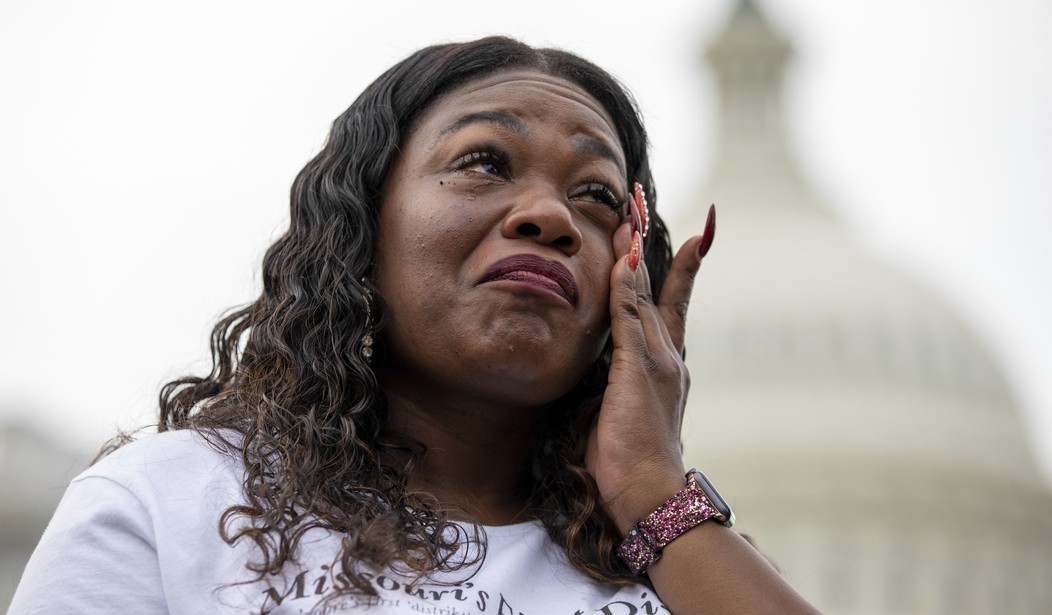Rep. Cori Bush (D-MO) recently shared a powerful personal story about abortion, telling Margaret Hoover on Firing Line that when she was 19 and went to a clinic for an abortion she had second thoughts, told the providers multiple times, “No, I’m not ready,” and that her pleas were ignored and the procedure carried out anyway. She concluded that her experience of being unheard or put into a position of less-than can be attributed to her being both black and a woman.
"I said, no, you know what, I'm not ready. And the nurse just wouldn't listen to me."@RepCori tells the "complicated" story of her second abortion, when her pleas to halt the procedure were ignored.
"I felt like it was, 'Oh well, we know better. You don't know what you need.'" pic.twitter.com/sdJaQRxVWb
— Firing Line with Margaret Hoover (@FiringLineShow) October 7, 2022
Firstly, I commend her for telling that story in public. While for many women, having an abortion is an emotional weight they carry throughout their lives, the story of a forced abortion is something truly traumatic to tell in front of a camera — and that is apparent, as the sadness is still evident on Bush’s face even decades later. And, while you may see the racial aspects as undermining the more obvious central point of how absolutely predatory the abortion industry is, from personal experience I believe that what happened to Bush had a lot to do with race.
By the Numbers
Recently, Kanye West (Ye) was interviewed by Tucker Carlson and shed light on some of the statistics by noting more black babies are aborted in New York than are born. That’s based on reality, solid data. And, the New York number is relative to the nation on the whole. A 2015 report to Congress said that Black women have the highest abortion ratio in the country, with 474 abortions per 1,000 live births. That’s close to half. In fact, over 18 million black babies have been aborted since Roe v. Wade, which would be roughly about 30 percent of the current US black population.
In the 1860 Census, the black population was about 14 percent, and the vast majority were still in slavery at the start of the Civil War. By 1900, that population had doubled from 4.4 million to 8.8 million. Today, black Americans make up around 13.6 percent of the US population. This means while every other minority group (likely excluding Native Americans) has surpassed black population growth per capita, including Asian and Latino communities, black populations have stayed pretty much at the same rate since slavery. The fact the US is aborting about half of the race before birth has much to do with it. We simply cannot divorce race from the abortion debate, with its roots in blatant eugenics and the accrued impacts on the community. That aspect of Bush’s story is sadly and genocidally commonplace.
Most people who are pro-life and familiar with the issue will agree there is alarming racial disparity in abortion, which by the left’s own lexicon means that abortion is a racist institution itself. They would agree also that abortion providers are pushy, offer few or often no alternatives, and fail to hear women expressing sentiments of second thoughts. That just isn’t a “choice” made available by the “choice” people.

No Opt-out for Evil Acts
I will attest to the pushiness of the industry myself. In my first pregnancy, I was further along by the time I had a positive pregnancy test than most women are. At-home tests and even my first test at a doctor’s office came out negative, so I was told to seek a blood pregnancy test the next time.
So, when I suspected I was pregnant with my second child and was getting negative at-home tests, I decided to turn up at a local Planned Parenthood hoping for a higher-quality clinical answer. And, I got it. In a sentence I will not forget for the rest of my life, I was informed I was pregnant and in the same breath asked if I want to terminate. Exactly like that. “You are pregnant. Do you want to terminate?” Firstly, if you could just give young women ten seconds to process the gravity of that news uninterrupted, that would be top-notch. Secondly, I will never forget that the existence of my child was announced along with an offer of her death.
Subpar Care for Black Women
Bush had a point about the treatment of black women in healthcare. There is data that demonstrates black women receive subpar medical treatment. Black women are more than three times more likely to die in pregnancy and childbirth. One study found that if black babies were in the care of black doctors their mortality rates were cut in half. Do we all understand the implications there? Emphasis on care. Often, black women’s symptoms and levels of pain they are reporting aren’t taken seriously. There is some idea that persists that black people do not feel pain at the same levels as others, and as stupid as that idea is, it finds its way into medical bias.
There are many stories of black women who died a fully preventable death because their care was compromised or their symptoms dismissed. I could pull more data, but I’d rather tell you what I have seen for myself.
Subpar Storytime
My former neighbor was a black woman; she was my friend and also babysat for me. One night she called me screaming in pain, and once I got a grasp of the situation I told her I would take her to the ER. By the time I got to my front door, she was in the fetal position on my doorstep. She had been complaining of dull abdominal pain but then it took this crazy turn of suddenly becoming sharp, and there was vomiting involved, so my best guess was that her appendix had ruptured and she needed immediate help. As I drove her to the ER I could tell that every bump and turn was agonizing to her. I don’t know if I had ever seen anyone in so much pain in my life at the time, and I had both attended and experienced unmedicated home births. This was not comparable to any births I had been around, for the record.
In triage, a nurse had the audacity to ask my young child if she thought that the patient “just had to fart.” I answered for my toddler, “No, we don’t think she has to fart.” I had been trying to explain to my child that her babysitter “has an owie” because this was a midnight emergency excursion for which the kiddo was not mentally or emotionally equipped. But, someone is reeling in pain and this “professional” is going to opt for a fart joke? This was the first sign that the patient was somehow not being taken seriously.
It took too long to get her any kind of pain relief, but the pain was finally being managed ten seconds after administration. She had an ultrasound, and CT scan and I helped my friend hobble to the bathroom to get the urine sample. This was the second strike for the medical providers — I am more than happy to help my friend, but I have zero training in patient mobility and we are dealing with a fall risk, which should be taken seriously. Meanwhile, as we waited for results I tried to prepare my friend for the reality that if this is a ruptured organ, she would need to mentally be ready to accept that she was headed to surgery that might include a transfer.

The doctor entered, said her name, and I responded enthusiastically, “Hi, Doctor!”… and it just hung in the cold, stale, air. The conversation reminded me of every doctor’s conversation I’ve seen where they smugly ask you questions they already have the answer to because they have decided what the issue is before setting eyes on you. She made us again go through all the symptoms she already knew about and had no interest in really hearing before she hit us with, “Everything came back normal. Did you know you had a two-sided uterus?”
We just looked at her blankly. I think I finally asked what a two-sided uterus meant. To be honest, I still don’t know what that means, but she said it like as almost an afterthought. Well, an afterthought she decided to lead with while telling us it was not the cause of my friend’s pain.
We were still looking at her for… you know… the answer as to why I found my neighbor collapsed on my porch screaming. She said all they found is a cyst on the ovary and that’s normal, and that it’s not the cause of the pain. She offered no answer, period.
No answer is our answer.
The doctor listened to my friend’s lungs with a stethoscope maybe just for the sake of doing something. She then asked my friend to lean up so she could listen on her back, but my poor friend had trouble with mobility. Instead of helping her, the doctor just stared at the wall behind me. There’s nothing on the wall, I got a good look at it all night. I repeat: She asked her to lean up, then ignored us and stared off at the wall until finally, my friend reached out to me, and I grabbed her arm to assist her, as if the doctor doesn’t do patient care and it’s my job. As if I am trained in how to help move people around in their beds. Once I got her leaning up, the doctor’s attention came off the wall and we stared at her as she continued to ignore all eye contact, then adjusted the bed to meet her in the upright position, possibly for fear of having to assist her patient back down or having to make any physical contact at all. It was shocking, watching a doctor ask a patient to do something they aren’t capable of without assistance and then stare at a wall until it was over.
Finally, a “cool nurse” came in, and now that the prison warden of a doctor was gone we were communicating in whispers. I asked the nurse, “What the heck was that?” And he actually did an impression of the doctor with her blinky eyes and withdrawn eye contact. She stares at walls a lot, I guess. I got the nurse to whisper to me the correct diagnosis, too. He said the cause of her pain was the cyst, which was over an inch in size, and that they cause great amounts of pain. We can’t get it on record; it’s a secret diagnosis just between us, as all competent medical care should be. (/Sarcasm)
The doctor won’t concede it’s anything at all, so our next focus is pain management aftercare. She told me she won’t give any narcotics because she wouldn’t have a way to code them (perhaps because she refused to diagnose the cyst as the cause of the pain?) and because if it is her appendix that she wouldn’t want her to not feel it at home. Are you kidding me? So, if you give someone a Vicodin, they totally miss their organs bursting open? I turned to Dr. House again and told her: “You didn’t find inflammation in the appendix, the white blood cell counts are normal, she has no fever, no viral symptoms, no bacterial symptoms and it looks like a physical obstruction to me. So cut this act. Two seconds ago it was nothing and now she can’t have meds because it could be something.” We are tap-dancing over policy when she abruptly blurts, “You knew before you came here we don’t take your insurance!”

Whoa, lady! My friend began to respond and I looked at her, thinking: Wait, let me handle this for you, lady in pain. I asked the doctor, “Did you just accuse us of something?” I didn’t know if she was insured or not, I wasn’t thinking about what card would come out of her wallet when I saw her in the fetal position outside my apartment and thought her appendix might have ruptured. I just took her to the nearest ER.
As we prepared to leave with our secret diagnosis, after wholly inadequate care and awful temperaments and armed with a prescription of Ibuprofen 800mg, Knowing that the doctor believed my friend was just there to get pain meds and wasn’t really in agonizing pain — despite the presence of the cyst that any woman who’s had one knows is extremely painful — I told the doctor she was potentially putting us in the position to have to call a drug dealer since all we have is immense pain and no solutions. The doctor’s little face contorted. I doubled down to demonstrate the situation by telling the doctor, “This is Vegas. I bet we can get opiates delivered faster than you can.” The point being: If we wanted to score prescription pain meds, we didn’t need to go through all these shenanigans. We are just some next-door neighbor moms who help each other out with our kids. Give me a break. While denying a proper diagnosis and treatment, this doctor is instead waging a war on drugs that we aren’t actually involved in or culpable for, while the doctors have more blame in that situation.
At some point, the doctor tried to cut me out of the scenario, because I was advocating for something like actual medical care to take place at any point in this encounter. She said, “I just need to ask my patient,” and my friend cut her off with, “No, she has my back 100 percent.” I could not imagine what my friend’s treatment would have been like had I not been there and had the gumption to push for any kind of care and to challenge what was taking place. What if I was not there to sweet-talk a secret diagnosis out of the benevolent nurse? They treated her like crap in front of me — who knows what her experience while in a vulnerable, painful circumstance would have been had I not been there.
Certainly, I left more in shock about how everybody but the underground railroad nurse had been awful to her than she did, because, hey, I’d never actually seen any black person’s medical care before and my friend had spent her whole life under whatever calloused suspicion, scrutiny, and disregard comes along with it. There is no way for me to rationalize all of the experiences we ran into without considering that my friend was black and that her skin color was her biggest obstacle in the situation.
Advocacy
I’ve seen many other situations of bad medical care but never had the same feeling of being disregarded simply because of skin color. I’ve bucked doctors before. I’ve seen a missed diagnosis of a kiddo who was allergic to Penicillin and was put through the wringer before that (fairly common) conclusion was accepted. I’ve refused a certain class of antibiotics and flat-out asked for another one because I wouldn’t take a black box warning drug when I can opt for something with a better safety profile. We arm wrestled over it until I laid it out for the doctor, saying, “Give me something that I will take.”
I’ve been in many contentious situations with medical care. I know how badly people need patient advocacy. I’m as comfortable as bystanders or patients can be, but I was not comfortable with how they treated my friend. When I disagree with doctors, it’s usually on the course of action, because I have strong foundations for why I am asking for something different. These are rational discussions, even if not always enjoyable. But I know that I’m not being disregarded; I’m simply disagreeing with the course of treatment. What happened to my friend was disregard, not disagreement. That’s totally different.
Despite whatever differences I have with Bush politically, I would have had her back 100 percent, too. Frankly, I do right now. I believe her. I believe her care had a lot to do with being a black woman, feeling marginalized, disempowered, not respected, not taken seriously, and subjected to an authority complex that didn’t have her interests — or her unborn child’s interests — at its core. I believe black women are targeted by the abortion complex and that she was treated like just another statistic, not as a human being who deserved her “right to choose” to be upheld when she was choosing to decline the procedure.
When people speak out on their traumatic experiences, especially with abortion care, we need to listen instead of looking for ways to avoid realities we simply aren’t comfortable with. A malpractice lawsuit should have been filed in Bush’s case. But, who worries about malpractice when the patient is a young, confused, minority that is economically strapped or would likely not be resorting to the procedure in the first place? Bush raised two issues, predatory abortion operatives and racially subpar treatment of black women in medical care. Both are true, both need to be brought to light, and one does not negate the other.














Join the conversation as a VIP Member